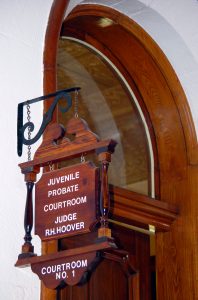 Clients frequently tell me that they want to get their criminal case done quickly. I am frequently told by clients that I should demand a trial immediately so that the case can be finished as soon as possible. It is important to understand what it means to make a demand for trial in a criminal case and why it may not always be the wisest decision to make. I want to take this opportunity to discuss what it means to demand a trial and explain to my readers what the implications of a demand for trial could be so they can make the best decision about how their criminal case should proceed.
Clients frequently tell me that they want to get their criminal case done quickly. I am frequently told by clients that I should demand a trial immediately so that the case can be finished as soon as possible. It is important to understand what it means to make a demand for trial in a criminal case and why it may not always be the wisest decision to make. I want to take this opportunity to discuss what it means to demand a trial and explain to my readers what the implications of a demand for trial could be so they can make the best decision about how their criminal case should proceed.
According to the Sixth Amendment to the United States Constitution, every criminal defendant has the constitutional right to a Speedy Trial. The Sixth Amendment protects defendants from waiting too long for a trial. We don’t want Defendants to be held in custody, or to be fighting criminal charges, to wait too long before being found innocent. The remedy for the violation of your Sixth Amendment right to a Speedy Trial is dismissal of your criminal case, with prejudice. This means that your case will be dismissed forever and you can never be charged again for that crime.
The right to a Speedy Trial is also set forth in the Illinois Constitution. However, the United States Constitution, and the Illinois Constitution, do not provide details about how much time you have to be tried in a criminal case. The time limits are set forth in a specific Statute in Illinois which provides the details of how much time the state has to bring you to trial once you make a Speedy Trial Demand. If you have been released from jail, the state has 160-days to bring you to trial from the date that you make a formal written Demand for Trial. If you are in custody, the state has 120-days from the date that you made a formal written Demand for Trial to bring you to trial.
 Chicago Criminal Lawyer Blog
Chicago Criminal Lawyer Blog


 The Coronavirus outbreak has had a major impact on our daily lives. The pandemic has had a substantial impact on our Court system and on the multitude of criminal cases that are pending in the area-Courthouses. Each County has taken substantial steps to stem the outbreak of this pandemic by limiting Court operations and taking affirmative steps to limit human contact in the Courthouses in the hopes of slowing down the progression of the virus which is at the heart of this problem. While most of the steps taken by all the Courts are similar, there are minor differences between the various counties in the area. I want to take this opportunity to point out what is happening from County to County, and how this may impact you, and your criminal case.
The Coronavirus outbreak has had a major impact on our daily lives. The pandemic has had a substantial impact on our Court system and on the multitude of criminal cases that are pending in the area-Courthouses. Each County has taken substantial steps to stem the outbreak of this pandemic by limiting Court operations and taking affirmative steps to limit human contact in the Courthouses in the hopes of slowing down the progression of the virus which is at the heart of this problem. While most of the steps taken by all the Courts are similar, there are minor differences between the various counties in the area. I want to take this opportunity to point out what is happening from County to County, and how this may impact you, and your criminal case. I often receive phone calls from clients asking me if they can go back home after they are released from jail or whether they can contact their boyfriend or girlfriend or spouse after being released from jail. I usually tell those clients to come to my office and bring all of the papers that were given to them when they were released from jail. It is very important to keep all of your papers with you if you are arrested and released by the Police so that you may appear for court. You should bring all of your paperwork with you when you are meeting with your lawyer.
I often receive phone calls from clients asking me if they can go back home after they are released from jail or whether they can contact their boyfriend or girlfriend or spouse after being released from jail. I usually tell those clients to come to my office and bring all of the papers that were given to them when they were released from jail. It is very important to keep all of your papers with you if you are arrested and released by the Police so that you may appear for court. You should bring all of your paperwork with you when you are meeting with your lawyer. In criminal cases, it is common for the prosecution to seek to admit into evidence things that were seized by the police as a result of the search of a residence. One of the first things that a criminal defense attorney does in a criminal case involving the search of a house is to determine whether the evidence seized by the police can be admitted in court.
In criminal cases, it is common for the prosecution to seek to admit into evidence things that were seized by the police as a result of the search of a residence. One of the first things that a criminal defense attorney does in a criminal case involving the search of a house is to determine whether the evidence seized by the police can be admitted in court. The other day I received a phone call from a client who is living in New York. The client told me that about 8 years ago, while they were living in Illinois, they were arrested for a felony drug case. They appeared in Court and eventually plead guilty and received probation. While the client was on probation, they moved to New York and never checked in with probation after leaving Illinois. They were just denied a job when a background search revealed an outstanding warrant for a Probation Violation out of Illinois. The client wanted to know what they could do to clear up the warrant and if they could hire me to take care of the warrant without the client having to come back to Illinois. I frequently receive phone calls from people who have outstanding warrants. As a matter of fact, while I was writing this article, I received a call from a client who found out that an arrest warrant was issued against him last night for a Domestic Battery. The client wanted to know if there was any way that I could make a call or do something to avoid him having to turn himself in and appear in Court. Unfortunately, there’s no easy way to take care of an outstanding arrest warrant. Let me explain.
The other day I received a phone call from a client who is living in New York. The client told me that about 8 years ago, while they were living in Illinois, they were arrested for a felony drug case. They appeared in Court and eventually plead guilty and received probation. While the client was on probation, they moved to New York and never checked in with probation after leaving Illinois. They were just denied a job when a background search revealed an outstanding warrant for a Probation Violation out of Illinois. The client wanted to know what they could do to clear up the warrant and if they could hire me to take care of the warrant without the client having to come back to Illinois. I frequently receive phone calls from people who have outstanding warrants. As a matter of fact, while I was writing this article, I received a call from a client who found out that an arrest warrant was issued against him last night for a Domestic Battery. The client wanted to know if there was any way that I could make a call or do something to avoid him having to turn himself in and appear in Court. Unfortunately, there’s no easy way to take care of an outstanding arrest warrant. Let me explain. A common question I get from clients is whether they will have to go to jail if they are arrested by the police. Yesterday, I received a telephone call from a prospective client who was caught shoplifting at a local Target. When he was approached by store security, he ran out of the store and jumped into his vehicle and left the store. He noticed the security guards chase him to his car and realized that they probably had his license plate number. The next day he spoke to a police officer who told him that they they have him on video committing the crime and leaving the store and would be charging him with a Retail Theft. He wanted to know whether he would go to jail if he turned himself in as the police had asked him to. This is a common question I get from people calling me and asking for my advice. Many people do not realize what happens when they are arrested and what their rights are when they are in the custody of the police and are not free to leave.
A common question I get from clients is whether they will have to go to jail if they are arrested by the police. Yesterday, I received a telephone call from a prospective client who was caught shoplifting at a local Target. When he was approached by store security, he ran out of the store and jumped into his vehicle and left the store. He noticed the security guards chase him to his car and realized that they probably had his license plate number. The next day he spoke to a police officer who told him that they they have him on video committing the crime and leaving the store and would be charging him with a Retail Theft. He wanted to know whether he would go to jail if he turned himself in as the police had asked him to. This is a common question I get from people calling me and asking for my advice. Many people do not realize what happens when they are arrested and what their rights are when they are in the custody of the police and are not free to leave. A very common question I get from clients with criminal cases is whether they have to appear for every Court date. Earlier today I received a phone call from a prospective client who is facing a Possession of Stolen Motor Vehicle (PSMV) case in DuPage County. He informed me that he failed to appear for his last court date and the Judge issued a warrant for his arrest with a bond of $30,000. The prospective client asked if I could file a Motion in DuPage County to have the warrant vacated without him having to show up. He also wanted to know whether he would ever have to show up to court if he hired me. Apparently, the prospective client was recently hired for a new job and his employer is not allowing him to take any days off.
A very common question I get from clients with criminal cases is whether they have to appear for every Court date. Earlier today I received a phone call from a prospective client who is facing a Possession of Stolen Motor Vehicle (PSMV) case in DuPage County. He informed me that he failed to appear for his last court date and the Judge issued a warrant for his arrest with a bond of $30,000. The prospective client asked if I could file a Motion in DuPage County to have the warrant vacated without him having to show up. He also wanted to know whether he would ever have to show up to court if he hired me. Apparently, the prospective client was recently hired for a new job and his employer is not allowing him to take any days off. Today we are going to talk about hearsay. The legal term, “hearsay,” is one of the most misunderstood legal terms in the law. Last weekend I had a client in my office that I was preparing to testify for a trial that was coming up. I asked the client a couple of questions and the client said that the Court would not allow me to ask that question because it was hearsay. I found myself explaining the term to the client and realize that most people do not really understand the legal meaning and implications of the term “hearsay.” So let me explain what hearsay is and how it could impact your criminal case.
Today we are going to talk about hearsay. The legal term, “hearsay,” is one of the most misunderstood legal terms in the law. Last weekend I had a client in my office that I was preparing to testify for a trial that was coming up. I asked the client a couple of questions and the client said that the Court would not allow me to ask that question because it was hearsay. I found myself explaining the term to the client and realize that most people do not really understand the legal meaning and implications of the term “hearsay.” So let me explain what hearsay is and how it could impact your criminal case. The title to this article comes from one of the most common questions I get asked by clients who call me to discuss their case. When I ask them what their question is, I’m frequently asked whether the client should have a lawyer for their case.
The title to this article comes from one of the most common questions I get asked by clients who call me to discuss their case. When I ask them what their question is, I’m frequently asked whether the client should have a lawyer for their case.